Error message
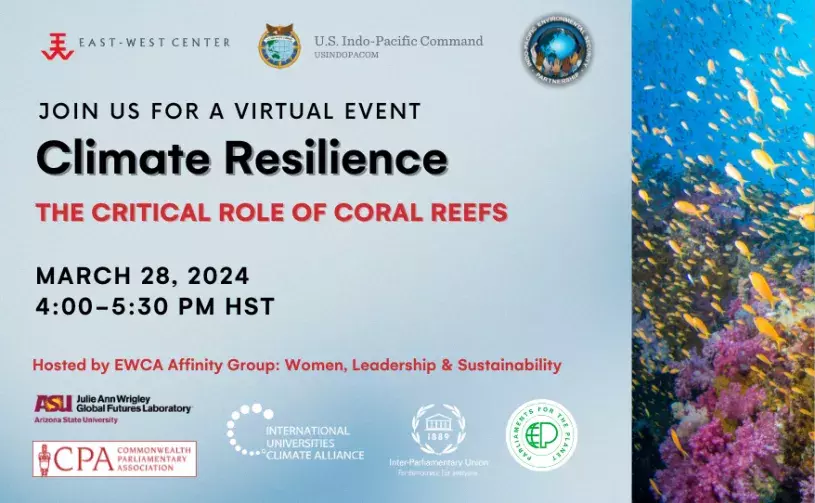
OFFICE/DEPARTMENT
2023 was the hottest year on record, with the 1.5 degree Celsius warning limit on temperature breached a number of times. As the climate crisis and average temperatures intensify, so do the frequency and severity of storms, coral bleaching and marine habitat loss. With that, commensurate risks increase to ocean wildlife, food sources and overall environmental security.
We know the problems. They are complex and inter-sectoral, and we need to engage across sectors and disciplines for the most impactful solutions.
Hear regional experts from defense, academia and civil society share best practices on how the role of satellites, big data and AI made available to all, scientific advances and successful community engagement can create models for practical action and positive outcomes.
The webinar will touch on the Allen Coral Atlas, a novel coral conservation tool powered by Arizona State University (ASU) and developed in partnership with coral reef scientists, universities, NGOs, and private entities. The Atlas utilizes high-resolution satellite imagery and advanced analytics to map and monitor the world’s coral reefs in unprecedented detail, informing policy and planning decisions at local and regional levels. Speakers will show how to leverage the Atlas for coral reef protection, with an emphasis on small island developing nations’ pressing climate challenges, including turbidity and reef bleaching. In addition to hearing about the Allen Coral Atlas, the virtual workshop will also hear from four East-West Center alumni and their work towards coral reef protection.
This collaborative webinar is co-convened by the following organizations:
- East-West Center Association Affinity Group: Women, Leadership & Sustainability
- Indo-Pacific Environmental Security Partnership's Education Working Group
- ASU Julie Ann Wrigley Global Futures Lab and the Allen Coral Atlas
- Commonwealth Parliamentary Association (Small States Branch)
- Inter-Parliamentary Union, Parliaments for the Planet
- International Universities Climate Alliance
With remarks by:
- Suzanne Vares-Lum, President, East-West Center
- Major General Joshua Rudd, Chief of Staff, IndoPACOM
- Martin Chungong, Secretary General, Inter-Parliamentary Union
- Stephen Twigg, Secretary General, Commonwealth Parliamentary Association
- Chris Howard, Chief Operating Officer, Arizona State University
Meet the Moderator
Ambassador Amanda Ellis
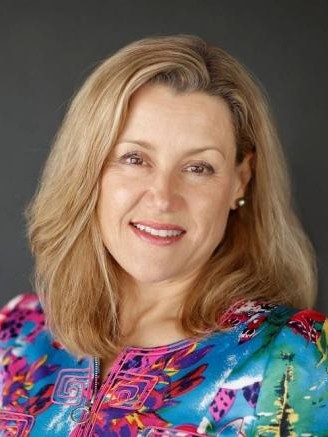
Former UN Ambassador and EWC Distinguished Alum awardee Amanda Ellis (Open Grants, 1989) is immediate past President of the EWCA and a passionate proponent of women’s empowerment to drive positive change for the planet. Previous roles include Deputy Secretary International Development, NZ Ministry of Foreign Affairs and first women to lead the NZ International Development Agency, Lead Specialist Poverty Reduction and Economic Management and Convenor of the President’s Global Private Sector CEO Forum to promote women’s economic empowerment at the World Bank, founder of the global gender program at the International Finance Corporation and co-founder of the Global Financial Alliance for Women. She is currently the Executive Director of the Asia Pacific for the Global Institute of Sustainability and Innovation, ASU Wrigley Global Futures Lab, and Co-chair of the WE (Women Entrepreneurs) Empower UN SDG Challenge launched by the Secretary General at UNGA in 2018 and of the New Carbon Economy Consortium.
Meet the Speakers
Dr. Laura Brewington
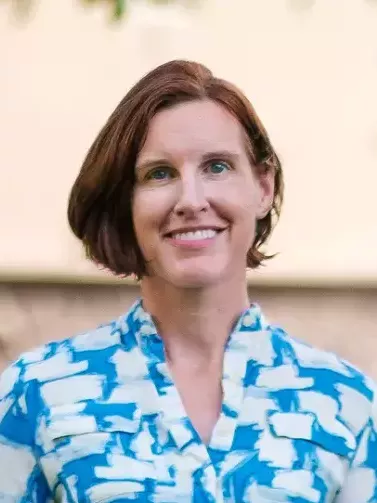
Laura Brewington, a Research Fellow at the East-West Center and Research Professor at Arizona State University, is a prominent figure in climate adaptation research in Pacific Islands. As the Lead Investigator of the Pacific Islands Climate, Health, and Migration project and Co-Lead Investigator of the Pacific Research on Island Solutions for Adaptation program, she focuses on collaborative, policy-oriented research to address climate challenges. With a PhD in Geography from the University of North Carolina, her earlier work concentrated on agriculture, invasive species, and conservation in the Galapagos Islands of Ecuador. Notably, Dr. Brewington co-founded the Pacific Regional Invasive Species and Climate Change management network, emphasizing a coordinated regional approach to international biosecurity and natural resources management. Her diverse expertise also includes a fellowship with WildAid, evaluating the Galapagos quarantine chain, and a post-doctoral fellowship with the Center for Galapagos Studies at the University of North Carolina–Chapel Hill.
Ms. Paulina Martin
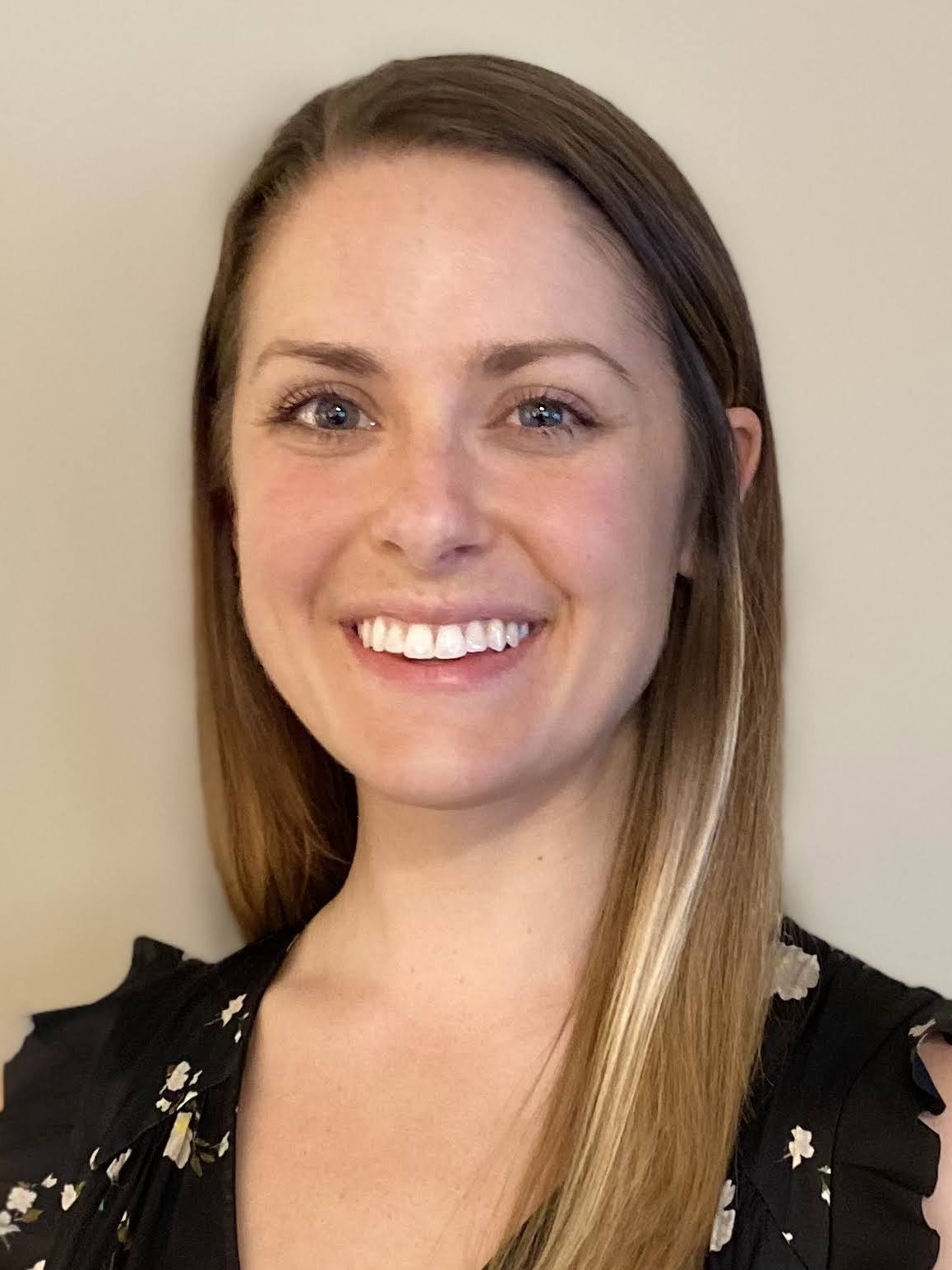
Paulina Martin is the Program Director of the Allen Coral Atlas, a platform housed at ASU’s Center for Global Discovery and Conservation Science, that provides coral reef mapping and monitoring resources to conservationists, scientists and decision-makers. Prior to joining ASU, she worked in program management at Vulcan Inc., the philanthropic organization founded by the late Paul G. Allen of Microsoft, and prior to that in NGOs focused on global development. Paulina is a certified project management professional and has a background in organizational management, community development and sociology. Paulina received her Master's degree in Sustainability Leadership from Arizona State University, and her Bachelor's degree in International Relations from the University of Delaware.
Admiral Piyal De Silva
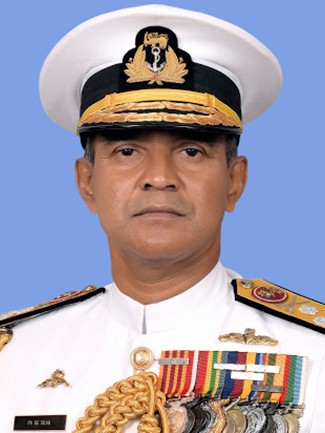
Admiral Piyal De Silva (Retd.), a seasoned naval officer, commenced his career in the Sri Lankan Navy in 1984, rising through the ranks to attain the prestigious rank of Admiral. Notably, he served as the immediate past convenor for the Indo-Pacific Command. With specialized training in Deep Sea Salvage Diving and Explosive Ordnance Disposal Diving from the US Navy, Admiral De Silva played a pivotal role in salvage and mine clearance operations during the conflict, defusing approximately 60 sea mines laid by LTTE Sea Tigers. Beyond his military achievements, he showcased his visionary leadership by spearheading the creation of the first-ever underwater museum, transforming it into a unique tourism destination. Admiral Piyal De Silva's commitment extends to environmental conservation, evident in his initiation of island-wide projects for coral re-plantation and regeneration of mangroves along coastal areas, reflecting his enduring passion for the maritime ecosystem.
Director General Sefanaia Nawadra
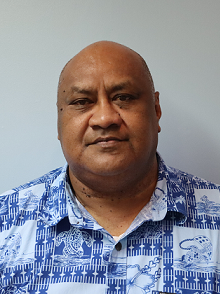
Sefanaia Nawadra (US Country Studies Program, 1995) started as Director General of Secretariat of the Pacific Regional Environment Program (SPREP) April 2022. He previously worked as UNEP’s Head of Pacific Office since June 2015 and in the Environment Sector in the Pacific Islands for over 30 years. He worked for the Secretariat for the Pacific Regional Environment Program (SPREP) for 10 years in two stints -1999-2006 as the Marine Pollution Adviser and from 2010 to May 2015 as the Director, Environmental Monitoring and Governance Division. Prior to that he worked as Director of Conservation International’s Fiji Country Program (4 years); Environmental Services Manager (Pacific islands) for Sinclair Knight Merz Engineering Consultants (3 years); Health Safety and Environment Manager for Shell Pacific Islands Limited (3 years) and a number of senior technical positions within the Fiji Government’s Environment and Agriculture Departments (6 years). He received his Bachelor of Applied Science in Environmental Engineering from the University of Canberra, Australia, and a Master of Science in Environmental Management from University of London in the UK.
Dr. Jodie Rummer
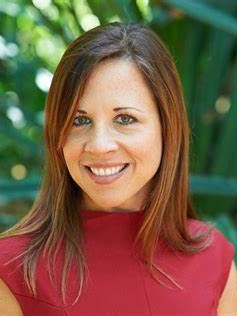
Jodie Rummer is a distinguished Professor of Marine Biology at James Cook University, recognized for her pioneering research in fish physiology, the evolution of oxygen transport, and the impact of stress on marine organisms. Formerly affiliated with the Australian Research Council Centre of Excellence for Coral Reef Studies, she leads a dynamic team addressing conservation challenges, particularly the effects of climate change on coral reef fishes, sharks, and rays. With a career marked by significant achievements, including an ARC Super Science Fellowship in 2011 Jodie actively collaborates on research projects, holds editorial roles in scientific journals, and contributes to the UNESCO Intergovernmental Oceanographic Committee advisory panel. Her academic journey, spanning the U.S., Canada, and Hong Kong, has garnered numerous accolades, including the prestigious UNESCO-L'Oréal Women in Science Fellowship, recognition as one of Australia's top scientists under 40, and the Society for Experimental Biology's President's Medal. With an impressive publication record, Jodie Rummer utilizes social media to communicate scientific findings, advocate for women in science, and promote diversity in STEM.
Dr. Emma Porio
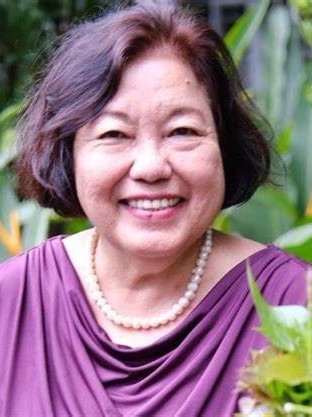
Emma Porio (Sociology, 1983), a distinguished academic, holds the position of Professor in the Department of Sociology and Anthropology at Ateneo de Manila University, also serving as a Science Research Fellow at Manila Observatory. She is a prominent figure, currently holding the presidency for the International Sociological Association's Clinical/Public Sociology Division (2019-2023) and the Asia Pacific Sociological Association (2020-2024). Recognized for her significant contributions, she was conferred the highest faculty rank of professor emeritus by the Ateneo de Manila University Board of Trustees and received the Manuel L. Quezon Dangal Award from the Quezon City Government for outstanding contributions and achievements. Dr. Porio has an extensive list of fellowships and grants, including the East-West Center Scholarship, Fulbright Advanced Research Fellowship, and Harvard Ash Institute Research Fellowship. She led the Coastal Cities at Risk: Investing in Climate and Disaster Resilience in the Philippines (CCARPH) project from 2017-2022 and is currently involved in institutionalizing its findings in academia and collaborating with various sectors. Additionally, she co-chairs the Climate Change Commission's National Panel of Technical Experts, holds positions as an Adjunct Research Fellow in Japan and Thailand, and is the elected co-chair of the International Climate Council Network's Adaptation Work Stream. Prof. Porio's leadership extends to research consortia, including the Global Urban Research Initiative and the Asian Social Well-Being Research Consortium, reflecting her dedication to advancing sociological and environmental research. She has also held significant roles in various academic and research organizations, such as president of the Philippine Sociological Society and chair of the Philippine Social Science Council.
Mr. Christopher Rosado
Christopher (Chris) Rosado (Indo-Pacific Leadership Lab, 2024) designs and implements collaborative evidence-based approaches to address complex interconnected social and environmental challenges. As a behavioral scientist at Creative Action Tank, a socially driven management consultancy, he partners with academic, private, and non- profit organizations to leverage data and enhance program interventions. He received his Master of Arts degree in Organizational Psychology from Columbia University. With over ten years of experience in Southeast Asia he has successfully led change management, marine conservation, research, education, and social entrepreneurship programs. Current projects include exploring community vulnerabilities to marine plastic waste, enhancing community driven coral reef conservation through technology, and piloting circular transformation opportunities with restaurant brands to achieve zero waste to landfill. Chris is concentrating on the intersection between marine ecosystems, community resilience and waste management to mitigate the adverse impacts of climate change and support the development of inclusive policy in the Asia-Pacific region.
Ms. Hadiyah Halid
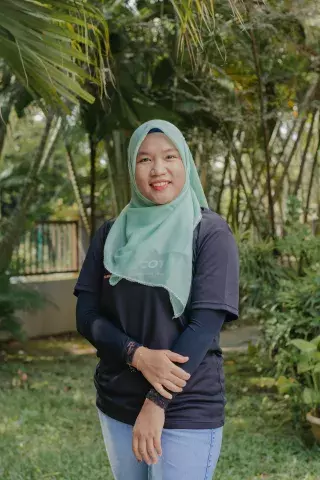
Originally from Malaysia, Hidayah Halid (Young Southeast Asian Leadership Initiative, 2016) is currently working as a manager for Perhentian Marine Research Station (PMRS), a marine conservation station in Perhentian Island. The station is committed to combining scientific findings with a bio-cultural conservation approach to sustain the dynamic and interdependence of social-ecological systems. She works with PMRS includes assessing and monitoring the marine habitat around the island, promoting participatory management of marine resources among the stakeholders, building capacity for native island youth in marine conservation and advocating marine conservation via volunteerism program with PMRS. Overall, she works mainly with the local community and stakeholders of Perhentian Island to integrate the scientific findings of PMRS with local involvement in marine conservation.
Dr. Kirsten Oleson
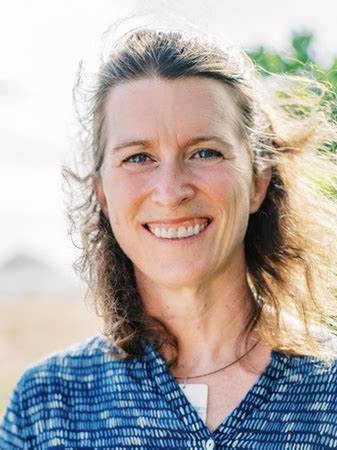
Kirsten Oleson (Research Program, 2016) is an ecological economist whose interdisciplinary approach combines elements from economics, ethics, sociology, and environmental science. Utilizing economic principles, Kirsten engages in addressing environmental policy challenges while acknowledging the inherent ethical assumptions within economics. Kirsten’s ongoing work seeks to enhance the incorporation of nature's goods and services into economic sustainability indicators. Following completion of her dissertation, she became a Teaching Fellow at Stanford University, engaging in diverse areas such as policy analysis, environmental ethics, and collective action. Subsequently, a post-doctoral venture in Madagascar, funded by the NSF, delved into fisheries management, coastal ecosystem services, community management, and climate change adaptation. Since 2012, Kirsten has been affiliated with the University of Hawaiʻi at Mānoa, focusing on integrating diverse methodologies to enhance natural resource and environmental management. In 2021, she also received a Pew Marine Conservation Fellowship for constructing coastal ecosystem accounts in Hawaiʻi.
Ms. Nadia Meredith-Hunt
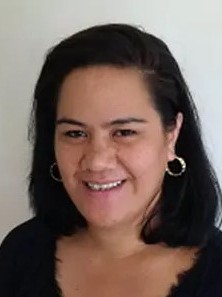
Nadia Meredith-Hunt (Changing Faces Women's Leadership Seminar, 2023) is the CEO and one of the principal consultants for KVAConsult. She joined KVAConsult in 2009 after her successful tenure within key Government agencies including the Ministry of Finance and Ministry of Foreign Affairs and Trade. During her time in Government, she took on the crucial role of Samoa Water Sector Support Project Manager for the EU funded program, where she oversaw the implementation and management of the multi-million-dollar program as well as aid coordination initiatives. Nadia’s expertise lies in high-level economic advice, public finance management, public policy analysis, monitoring and evaluation and climate finance. She holds a master’s degree in international business from Deakin University, which has fortified her understanding of the global business landscape and its intricate dynamics. Additionally, she earned her Bachelor of Commerce and Management degree from Lincoln University, Christchurch, New Zealand.
2023 was the hottest year on record, with the 1.5 degree Celsius warning limit on temperature breached a number of times. As the climate crisis and average temperatures intensify, so do the frequency and severity of storms, coral bleaching and marine habitat loss. With that, commensurate risks increase to ocean wildlife, food sources and overall environmental security.
We know the problems. They are complex and inter-sectoral, and we need to engage across sectors and disciplines for the most impactful solutions.
Hear regional experts from defense, academia and civil society share best practices on how the role of satellites, big data and AI made available to all, scientific advances and successful community engagement can create models for practical action and positive outcomes.
The webinar will touch on the Allen Coral Atlas, a novel coral conservation tool powered by Arizona State University (ASU) and developed in partnership with coral reef scientists, universities, NGOs, and private entities. The Atlas utilizes high-resolution satellite imagery and advanced analytics to map and monitor the world’s coral reefs in unprecedented detail, informing policy and planning decisions at local and regional levels. Speakers will show how to leverage the Atlas for coral reef protection, with an emphasis on small island developing nations’ pressing climate challenges, including turbidity and reef bleaching. In addition to hearing about the Allen Coral Atlas, the virtual workshop will also hear from four East-West Center alumni and their work towards coral reef protection.
This collaborative webinar is co-convened by the following organizations:
- East-West Center Association Affinity Group: Women, Leadership & Sustainability
- Indo-Pacific Environmental Security Partnership's Education Working Group
- ASU Julie Ann Wrigley Global Futures Lab and the Allen Coral Atlas
- Commonwealth Parliamentary Association (Small States Branch)
- Inter-Parliamentary Union, Parliaments for the Planet
- International Universities Climate Alliance
With remarks by:
- Suzanne Vares-Lum, President, East-West Center
- Major General Joshua Rudd, Chief of Staff, IndoPACOM
- Martin Chungong, Secretary General, Inter-Parliamentary Union
- Stephen Twigg, Secretary General, Commonwealth Parliamentary Association
- Chris Howard, Chief Operating Officer, Arizona State University
Meet the Moderator
Ambassador Amanda Ellis

Former UN Ambassador and EWC Distinguished Alum awardee Amanda Ellis (Open Grants, 1989) is immediate past President of the EWCA and a passionate proponent of women’s empowerment to drive positive change for the planet. Previous roles include Deputy Secretary International Development, NZ Ministry of Foreign Affairs and first women to lead the NZ International Development Agency, Lead Specialist Poverty Reduction and Economic Management and Convenor of the President’s Global Private Sector CEO Forum to promote women’s economic empowerment at the World Bank, founder of the global gender program at the International Finance Corporation and co-founder of the Global Financial Alliance for Women. She is currently the Executive Director of the Asia Pacific for the Global Institute of Sustainability and Innovation, ASU Wrigley Global Futures Lab, and Co-chair of the WE (Women Entrepreneurs) Empower UN SDG Challenge launched by the Secretary General at UNGA in 2018 and of the New Carbon Economy Consortium.
Meet the Speakers
Dr. Laura Brewington

Laura Brewington, a Research Fellow at the East-West Center and Research Professor at Arizona State University, is a prominent figure in climate adaptation research in Pacific Islands. As the Lead Investigator of the Pacific Islands Climate, Health, and Migration project and Co-Lead Investigator of the Pacific Research on Island Solutions for Adaptation program, she focuses on collaborative, policy-oriented research to address climate challenges. With a PhD in Geography from the University of North Carolina, her earlier work concentrated on agriculture, invasive species, and conservation in the Galapagos Islands of Ecuador. Notably, Dr. Brewington co-founded the Pacific Regional Invasive Species and Climate Change management network, emphasizing a coordinated regional approach to international biosecurity and natural resources management. Her diverse expertise also includes a fellowship with WildAid, evaluating the Galapagos quarantine chain, and a post-doctoral fellowship with the Center for Galapagos Studies at the University of North Carolina–Chapel Hill.
Ms. Paulina Martin

Paulina Martin is the Program Director of the Allen Coral Atlas, a platform housed at ASU’s Center for Global Discovery and Conservation Science, that provides coral reef mapping and monitoring resources to conservationists, scientists and decision-makers. Prior to joining ASU, she worked in program management at Vulcan Inc., the philanthropic organization founded by the late Paul G. Allen of Microsoft, and prior to that in NGOs focused on global development. Paulina is a certified project management professional and has a background in organizational management, community development and sociology. Paulina received her Master's degree in Sustainability Leadership from Arizona State University, and her Bachelor's degree in International Relations from the University of Delaware.
Admiral Piyal De Silva

Admiral Piyal De Silva (Retd.), a seasoned naval officer, commenced his career in the Sri Lankan Navy in 1984, rising through the ranks to attain the prestigious rank of Admiral. Notably, he served as the immediate past convenor for the Indo-Pacific Command. With specialized training in Deep Sea Salvage Diving and Explosive Ordnance Disposal Diving from the US Navy, Admiral De Silva played a pivotal role in salvage and mine clearance operations during the conflict, defusing approximately 60 sea mines laid by LTTE Sea Tigers. Beyond his military achievements, he showcased his visionary leadership by spearheading the creation of the first-ever underwater museum, transforming it into a unique tourism destination. Admiral Piyal De Silva's commitment extends to environmental conservation, evident in his initiation of island-wide projects for coral re-plantation and regeneration of mangroves along coastal areas, reflecting his enduring passion for the maritime ecosystem.
Director General Sefanaia Nawadra

Sefanaia Nawadra (US Country Studies Program, 1995) started as Director General of Secretariat of the Pacific Regional Environment Program (SPREP) April 2022. He previously worked as UNEP’s Head of Pacific Office since June 2015 and in the Environment Sector in the Pacific Islands for over 30 years. He worked for the Secretariat for the Pacific Regional Environment Program (SPREP) for 10 years in two stints -1999-2006 as the Marine Pollution Adviser and from 2010 to May 2015 as the Director, Environmental Monitoring and Governance Division. Prior to that he worked as Director of Conservation International’s Fiji Country Program (4 years); Environmental Services Manager (Pacific islands) for Sinclair Knight Merz Engineering Consultants (3 years); Health Safety and Environment Manager for Shell Pacific Islands Limited (3 years) and a number of senior technical positions within the Fiji Government’s Environment and Agriculture Departments (6 years). He received his Bachelor of Applied Science in Environmental Engineering from the University of Canberra, Australia, and a Master of Science in Environmental Management from University of London in the UK.
Dr. Jodie Rummer

Jodie Rummer is a distinguished Professor of Marine Biology at James Cook University, recognized for her pioneering research in fish physiology, the evolution of oxygen transport, and the impact of stress on marine organisms. Formerly affiliated with the Australian Research Council Centre of Excellence for Coral Reef Studies, she leads a dynamic team addressing conservation challenges, particularly the effects of climate change on coral reef fishes, sharks, and rays. With a career marked by significant achievements, including an ARC Super Science Fellowship in 2011 Jodie actively collaborates on research projects, holds editorial roles in scientific journals, and contributes to the UNESCO Intergovernmental Oceanographic Committee advisory panel. Her academic journey, spanning the U.S., Canada, and Hong Kong, has garnered numerous accolades, including the prestigious UNESCO-L'Oréal Women in Science Fellowship, recognition as one of Australia's top scientists under 40, and the Society for Experimental Biology's President's Medal. With an impressive publication record, Jodie Rummer utilizes social media to communicate scientific findings, advocate for women in science, and promote diversity in STEM.
Dr. Emma Porio

Emma Porio (Sociology, 1983), a distinguished academic, holds the position of Professor in the Department of Sociology and Anthropology at Ateneo de Manila University, also serving as a Science Research Fellow at Manila Observatory. She is a prominent figure, currently holding the presidency for the International Sociological Association's Clinical/Public Sociology Division (2019-2023) and the Asia Pacific Sociological Association (2020-2024). Recognized for her significant contributions, she was conferred the highest faculty rank of professor emeritus by the Ateneo de Manila University Board of Trustees and received the Manuel L. Quezon Dangal Award from the Quezon City Government for outstanding contributions and achievements. Dr. Porio has an extensive list of fellowships and grants, including the East-West Center Scholarship, Fulbright Advanced Research Fellowship, and Harvard Ash Institute Research Fellowship. She led the Coastal Cities at Risk: Investing in Climate and Disaster Resilience in the Philippines (CCARPH) project from 2017-2022 and is currently involved in institutionalizing its findings in academia and collaborating with various sectors. Additionally, she co-chairs the Climate Change Commission's National Panel of Technical Experts, holds positions as an Adjunct Research Fellow in Japan and Thailand, and is the elected co-chair of the International Climate Council Network's Adaptation Work Stream. Prof. Porio's leadership extends to research consortia, including the Global Urban Research Initiative and the Asian Social Well-Being Research Consortium, reflecting her dedication to advancing sociological and environmental research. She has also held significant roles in various academic and research organizations, such as president of the Philippine Sociological Society and chair of the Philippine Social Science Council.
Mr. Christopher Rosado
Christopher (Chris) Rosado (Indo-Pacific Leadership Lab, 2024) designs and implements collaborative evidence-based approaches to address complex interconnected social and environmental challenges. As a behavioral scientist at Creative Action Tank, a socially driven management consultancy, he partners with academic, private, and non- profit organizations to leverage data and enhance program interventions. He received his Master of Arts degree in Organizational Psychology from Columbia University. With over ten years of experience in Southeast Asia he has successfully led change management, marine conservation, research, education, and social entrepreneurship programs. Current projects include exploring community vulnerabilities to marine plastic waste, enhancing community driven coral reef conservation through technology, and piloting circular transformation opportunities with restaurant brands to achieve zero waste to landfill. Chris is concentrating on the intersection between marine ecosystems, community resilience and waste management to mitigate the adverse impacts of climate change and support the development of inclusive policy in the Asia-Pacific region.
Ms. Hadiyah Halid

Originally from Malaysia, Hidayah Halid (Young Southeast Asian Leadership Initiative, 2016) is currently working as a manager for Perhentian Marine Research Station (PMRS), a marine conservation station in Perhentian Island. The station is committed to combining scientific findings with a bio-cultural conservation approach to sustain the dynamic and interdependence of social-ecological systems. She works with PMRS includes assessing and monitoring the marine habitat around the island, promoting participatory management of marine resources among the stakeholders, building capacity for native island youth in marine conservation and advocating marine conservation via volunteerism program with PMRS. Overall, she works mainly with the local community and stakeholders of Perhentian Island to integrate the scientific findings of PMRS with local involvement in marine conservation.
Dr. Kirsten Oleson

Kirsten Oleson (Research Program, 2016) is an ecological economist whose interdisciplinary approach combines elements from economics, ethics, sociology, and environmental science. Utilizing economic principles, Kirsten engages in addressing environmental policy challenges while acknowledging the inherent ethical assumptions within economics. Kirsten’s ongoing work seeks to enhance the incorporation of nature's goods and services into economic sustainability indicators. Following completion of her dissertation, she became a Teaching Fellow at Stanford University, engaging in diverse areas such as policy analysis, environmental ethics, and collective action. Subsequently, a post-doctoral venture in Madagascar, funded by the NSF, delved into fisheries management, coastal ecosystem services, community management, and climate change adaptation. Since 2012, Kirsten has been affiliated with the University of Hawaiʻi at Mānoa, focusing on integrating diverse methodologies to enhance natural resource and environmental management. In 2021, she also received a Pew Marine Conservation Fellowship for constructing coastal ecosystem accounts in Hawaiʻi.
Ms. Nadia Meredith-Hunt

Nadia Meredith-Hunt (Changing Faces Women's Leadership Seminar, 2023) is the CEO and one of the principal consultants for KVAConsult. She joined KVAConsult in 2009 after her successful tenure within key Government agencies including the Ministry of Finance and Ministry of Foreign Affairs and Trade. During her time in Government, she took on the crucial role of Samoa Water Sector Support Project Manager for the EU funded program, where she oversaw the implementation and management of the multi-million-dollar program as well as aid coordination initiatives. Nadia’s expertise lies in high-level economic advice, public finance management, public policy analysis, monitoring and evaluation and climate finance. She holds a master’s degree in international business from Deakin University, which has fortified her understanding of the global business landscape and its intricate dynamics. Additionally, she earned her Bachelor of Commerce and Management degree from Lincoln University, Christchurch, New Zealand.





